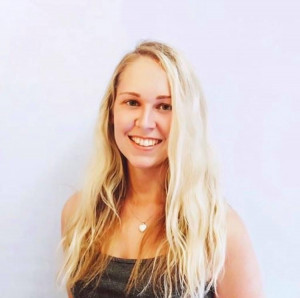“Hello, I Would Like Support for my Eating Disorder…”
Recognising that you are using food or exercise to cope can be tricky. When we experience challenges in life and find ourself trying to navigate the situation, wondering how to respond, we sometimes turn to unhealthy ways to cope. These strategies may see us through those challenges and help us feel better in the moment, but using these ways of coping can become a way of life and cause more damage than the initial event.
After 4 years of dipping in and out of food as a way to cope, I was 17 when my eating disorder became a part of my life, a part of me. In fact, at times, it felt it was me.
Just as is the case for many others, it was those around me who noticed the changes and could see how unhappy I was becoming. I was living it and yet couldn’t see how damaging it was, not just to my health but to my friendships, studying, social life and general happiness.
Eventually, enough was enough for my nearest and dearest, and one day my mum sat me down and said I needed to see a doctor. In my bewilderment that anyone was even concerned, and denial that anything was that bad, I agreed for her to make an appointment with my GP.
–
When you have an eating disorder, there is usually a strong incongruence and conflict going on internally. Part of you knows you are unhappy, knows that something isn’t right, or that spending so much time obsessed with food/exercise/how you look etc isn’t ‘normal’. But part of you – or perhaps the eating disorder – does not want to acknowledge this.
It may be scared of letting go of what has served as a comfort, a friend, a way to get you through the bad times. Maybe this part has a fear of what would happen without it. Who are you now without your eating disorder? What would life look like without it?
It can be overwhelming. And keeping the eating disorder fuelled by this fear feels easier.
Quite often, it is Part Number Two that is good at voicing itself, hiding the fear that is sitting behind it in a desperate bid to keep some ‘control’ and comfort. This presents a real issue when trying to reach out for help. Part Number One found itself very quiet when confronted with the GP.
As if it wasn’t challenging enough to allow the true scared Rosie to be heard, she found herself at the other side of big desk, from a GP who was three times her age and sat looking at his computer, with no attempt to make eye contact or offer comfort or reassurance.
Instead, on quietly sharing that I was “struggling with food”, the GP asked me to step onto the scales. I remember clearly the instant panic that arose within, and fumbled over my words as I asked if I should take my shoes off. He said no, to which a conflict was added into my very busy head – is it a good thing so that my weight may look a little higher, or a bad thing because he will think I am bigger than I already feel I am?
The next words to come out of his mouth were some I will never forget, and have since heard from many service users’ stories at First Steps ED over the years.
“Your weight is not quite low enough for me to refer you on”
Interpretation: you aren’t severe enough for help. Eating disorder interpretation: you are too fat/big/unworthy of help.
Those maladaptive eating disorder responses are, of course, untrue. But in the midst of it, you just don’t know that, and you accept those things in a heartbeat. It can be the difference between the beginning of support, treatment, and recovery, or spiralling even further into a black hole.
Fortunately for me, with the support of friends, family, and finding purpose I was able to begin my recovery journey later that year. Accessing one of the First Steps ED groups for 6 months then gave me the much-needed boost to keep my recovery going.
The good news is GP’s and professionals are receiving better training since my experience 13 years ago. There is more awareness of eating disorders than there ever has been (though of course, there is always more work to do).
In the years following my first experience of going to the doctors about mental health, I have become an expert in such conversations, so I would like to share my recommendations. I hope this gives you the confidence you need to visit your GP, voicing yourself when sat in that office or taking those first steps.
–
Ask for a mental health practitioner
Many surgeries have mental health workers, or doctors who have specialist knowledge in this area. Does yours have one? How can you find out if they do? Perhaps your practise has a website, or you can call the surgery number to ask them. You may then be able to book an appointment with that person.
Do some research
Do you know what support services are out there? Sometimes you may be able to suggest or request a referral. GP’s have to try and know a bit about a huge multitude of physical and mental health problems, they may not always know about the options or services available. For example, referrals into NHS Eating Disorder Services usually require a GP to refer, so at First Steps ED we sometimes recommend service users to ask their GP for that referral to be made.
Consider what outcomes you want
Having a think about what you would like from the appointment can be a helpful way to focus and give you confidence to ask. However, it is also okay if you aren’t sure, or if you are looking for this advice from the GP – consider communicating this with them.
Write down what you want to say
Whether you write a paragraph to describe your difficulties, or bullet point the key areas, this is a sure-fire way to say exactly what you want to. If you are someone who easily forgets when anxious or under pressure, this allows you to communicate and have your voice heard in a different way. You could read out what you have written or even give it to the GP to read there and then.
Take a trusted person with you
Think of a person in your life who trust and would like by your side for the appointment. Their role may vary depending on your wants and needs; are they a silent comforter, there for moral support? Or are they your voice? It may be helpful to explain to them that you would like from them, and from the appointment.
Didn’t go to plan? It’s okay!
The first few times I made appointments for my eating disorder or other mental health, I became very flustered and stumbled over my words. It’s okay if you do too. It is not always easy to talk about, and trying to explain to someone else when you feel confused yourself is far from straightforward! The more you talk about it, the easier it gets.
If you still didn’t have the outcome you wanted, don’t give up. Is there another way to approach this again, or another practitioner you could speak to? There will likely be other options, give yourself the chance to look at the next one – you absolutely deserve the chance.

Contributed by Rosie Hibberd,
First Steps ED Operations Lead


